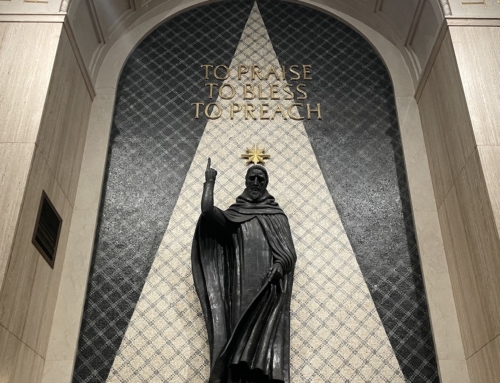I hope no tonge moght endure, I judge no tongue e’er found before
No saverly saghe say of that syght, Words to say that splendid sight,
So was hit clene and cler and pure, So clean it was, so clear, so pure.
That precios perle ther hit was pyght. That precious pearl there so bedight.
– from the Middle English poem Pearl (14th century)
What’s in a word? The glib phrase, saying or chatter we choose could mean friendship or conflict, battle or appeasement. Why do we put stock in these vocal sounds? Do words help or hinder us in describing the world? What about in describing God?
Four points may help us see why we use words, especially to speak of God.
First, words tell what we know. Words are signs of ideas, and our ideas are likenesses of things. They are the building stones to any poem, prose, or tweet that join subject to predicate in conveying our thoughts. Words declare our knowledge (or ignorance) which in turn rests on our experience. Words reveal the time, place, doing, suffering, how-much-of and meaning of a thing so far as we know it.
Second, words can point us to God. Faith pertains to divine truth, and we name God by many phrases (to name some common ones from the Psalms: light, life, rock, merciful, almighty, just, true). Words articulate what’s real. Our names for God reveal something that is real about God.
But do these earthly names rightly reflect the divine? How can ours, bounded by limited experience, portray God? So asks St. Augustine:
What happened in my heart when I said “God”? A certain great and perfect substance was in our thoughts transcend[ing] every changeable creature of flesh and soul…. living, eternal, omnipotent, everywhere present, everywhere whole, nowhere confined…
– St. Augustine, Homilies on John, Tractate 1.
Pseudo-Dionysius suggests the same:
The higher we ascend, the more our words are limited…. just as now, when we plunge into the darkness which is beyond intellect, we encounter not merely a shortage of speech, but a complete loss of words and thought…. And after the complete ascent we are wholly voiceless…
– The Mystical Theology, Chap. III
Do not words, then, butt up against their limits in describing God? The final two points help address this question.
Third, we can use what we know about creatures to speak of God.We make statements from words to know things through them. Since we know creatures better than God, we start from the partial goodness of creation to speak of its perfect Creator. Every creature has some type of goodness and perfection, and from these traits we are led towards the complete and simple perfection of God. Creatures, then, act as a sign-post which point our thoughts and words towards God. But since our knowledge is based on creaturely pictures, our words need cleansing before naming God’s simple existence.
Lastly, we should note that God speaks to us by being truth himself. God is truth inasmuch as he exists, and so any verbal portrait of God will stand in reference to his unpictured existence. But God does more than simply listen to the descriptions we give him. God is active in the cosmos as its first and sustaining and redeeming cause, and pours truth into heaven and earth, our minds and our lips as we speak of him in reason and in faith. We can use words to speak about God because he has taught us the correct words to use. As Primal Truth he grounds our phrases in his existence. This is why he is best named He who is (Exod. 3:14), the closest written English can approach to describing personal infinity. Our naming God, then, is less like painting a far-away figure and more like plant-life that grows from the earth receiving rain.
Language doesn’t hinder but helps us attain God. Like a ladder’s steps, words are how we climb heavenward. In this way faith’s language is like Christ’s incarnation. Just as God uses small words to contain our faith’s truth, so his spoken Word took on our manhood and, in love, became little:
I cannot find the time to write you [a] long letter….nonetheless…I send you a very little word, the Word made little in the crib, the Word who was made flesh for us….Read over this Word in your heart, turn it over in your mind, let it be sweet as honey on your lips…that it may dwell with you and in you forever.
– From Bl. Jordan’s letter to Bl. Diana for Christmas, 1223
✠
Image: Giotto, St. Francis Preaching to the Birds







